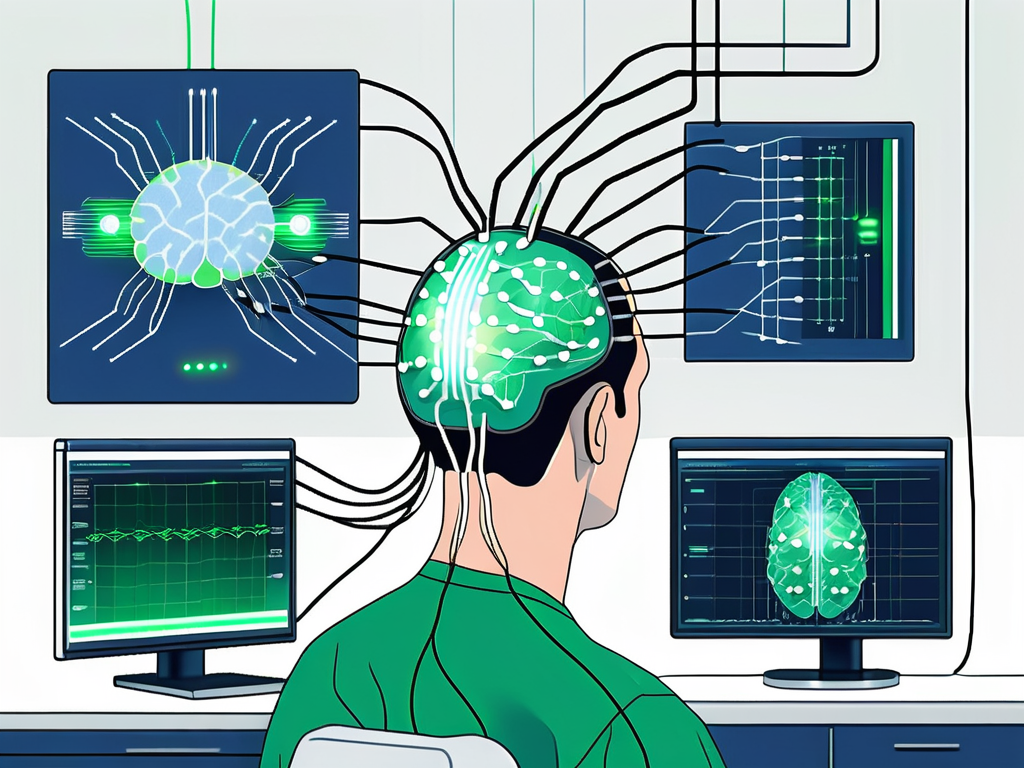Becoming an EEG (Electroencephalogram) Technician can be a rewarding career choice for those interested in the medical field and neurology. EEG Technicians play a crucial role in diagnosing and treating neurological conditions such as epilepsy, stroke, and other disorders affecting the brain. This guide will provide you with a comprehensive step-by-step process to kickstart your career as an EEG Technician.
Understanding the Role of an EEG Technician
An EEG Technician, also known as an Electroencephalographic Technician, is a healthcare professional who uses specialized equipment to detect abnormalities in brain waves and electrical activity of the brain. These findings are critical in diagnosing and treating neurological disorders.
EEG Technicians work closely with neurologists, interpreting the results of EEG tests and providing valuable insights for patient care. They also interact directly with patients, explaining procedures and ensuring their comfort during the testing process.
Key Responsibilities of an EEG Technician
EEG Technicians have a range of responsibilities that go beyond operating EEG machines. They are responsible for preparing patients for the EEG procedure, which includes explaining the process, attaching electrodes to the patient’s scalp, and monitoring the patient’s status during the test.
They also analyze and interpret the recorded data, identifying any abnormalities in the brain waves that could indicate a neurological disorder. In addition, they maintain and calibrate EEG equipment to ensure accurate results.
Steps to Becoming an EEG Technician
Becoming an EEG Technician involves a combination of education, training, and certification. Here is a step-by-step guide to help you navigate this career path.
Step 1: Obtain a High School Diploma
Your journey to becoming an EEG Technician starts with a high school diploma or equivalent. Courses in biology, chemistry, physics, and mathematics provide a solid foundation for the medical knowledge required in this field.
Additionally, developing skills in communication and problem-solving during high school can be beneficial in your future role as an EEG Technician, as the job involves interacting with patients and interpreting complex data.
Step 2: Complete Postsecondary Education
After high school, aspiring EEG Technicians typically need to complete a postsecondary education program in neurodiagnostic technology. These programs, which can be found at community colleges and technical schools, usually take two years to complete and lead to an associate degree.
Coursework typically includes medical terminology, neuroanatomy, neurophysiology, and the principles of EEG. Practical training in a clinical setting is also a crucial part of these programs, providing hands-on experience with EEG equipment and procedures.
Step 3: Gain Clinical Experience
Upon completion of an educational program, gaining hands-on experience through an internship or entry-level job is essential. This experience allows you to apply your theoretical knowledge in a real-world setting, under the supervision of experienced professionals.
During this phase, you will learn how to interact with patients, operate and maintain EEG equipment, and interpret EEG results. This experience is also valuable when seeking certification, as it is often a requirement.
Step 4: Obtain Certification
Certification is not always mandatory to work as an EEG Technician, but it is highly recommended as it demonstrates your competence and commitment to the field. The most recognized certification is offered by the American Board of Registration of Electroencephalographic and Evoked Potential Technologists (ABRET).
To become certified, you must meet certain educational and clinical experience requirements and pass an examination. Maintaining your certification requires ongoing education to stay updated with the latest advancements in the field.
Skills and Qualities of a Successful EEG Technician
While education and training are critical, certain skills and qualities can enhance your success as an EEG Technician.
Technical Skills
EEG Technicians need to be comfortable with technology, as they work with complex equipment on a daily basis. They must also have a keen eye for detail to accurately interpret EEG results and detect any abnormalities.
Interpersonal Skills
As EEG Technicians often interact with patients who may be anxious or stressed, excellent interpersonal skills are essential. They must be able to explain procedures clearly and provide reassurance to patients.
Problem-Solving Skills
EEG Technicians must be able to think critically and solve problems efficiently. If an issue arises during an EEG procedure, they must be able to troubleshoot the problem and find a solution quickly.
Job Outlook and Salary for EEG Technicians
The demand for EEG Technicians is expected to grow in the coming years, driven by the aging population and increased prevalence of neurological disorders. According to the U.S. Bureau of Labor Statistics, the employment of health technologists and technicians, including EEG Technicians, is projected to grow 8 percent from 2019 to 2029, faster than the average for all occupations.
The median annual wage for health technologists and technicians was $44,380 in May 2020. However, salaries can vary widely depending on factors such as location, experience, and certification.
Conclusion
Becoming an EEG Technician requires a mix of education, hands-on training, and certification. While the journey can be challenging, the reward of helping patients and contributing to their healthcare makes it a worthwhile career choice. With the growing demand for healthcare professionals, now is an excellent time to consider a career as an EEG Technician.
Kickstart Your Career with Neuro Pathway
If you’re inspired to become an EEG Technician and ready to explore new job opportunities, Neuro Pathway is your ideal partner. We are committed to empowering Neurodiagnostic Professionals like you with the resources and guidance needed to advance in this dynamic field. Take advantage of our Career Coaches, educational resources, and access to a network of employment opportunities. Begin your journey today and Find New Job Opportunities with the support of Neuro Pathway.






